- Home
- Tatiana de Rosnay
Sarah's Key Page 3
Sarah's Key Read online
Page 3
"What do you mean, Papa? Where are we going? Why aren't we going back home? You tell me! Tell me!"
She nearly screamed the last words.
Her father looked down at her. He said her name again, very softly. His eyes were still wet, his eyelashes spiked with tears. He put his hand on the back of her neck.
"Be brave, my sweet love. Be brave, as brave as you can."
She could not cry. Her fear was so great it seemed to engulf everything else, it seemed to suck up every single emotion within her, like a monstrous, powerful vacuum.
"But I promised him I'd come back, Papa. I promised him."
The girl saw that he had started to cry again, that he wasn't listening to her. He was wrapped up in his own grief, in his own fear.
They were all sent outside. The street was empty, save for buses lined up by the sidewalks. The kind of ordinary buses the girl used to take with her mother and her brother to get about town-ordinary, everyday green-and-white buses with platforms at the rear.
They were ordered to get on the buses and were pushed against each other. The girl looked again for green-gray uniforms, for the curt, guttural language she had grown to fear. But these were only policemen. French policemen.
Through the bus's dusty pane, she recognized one of them, the young red-haired one who had often helped her cross the street on her way home from school. She tapped on the glass to attract his attention. When his eyes locked onto hers, he quickly looked away. He seemed embarrassed, almost annoyed. She wondered why. As they were all pushed into the buses, a man protested and was shoved, violently by police. A policeman yelled that he'd shoot if anybody tried to get away.
Listlessly, the girl watched the buildings, the trees drift by. She could only think of her brother in the cupboard, in the empty house, waiting for her. She could only think of him. They crossed a bridge, she saw the Seine sparkle. Where were they going? Papa didn't know. Nobody knew. They were all afraid.
A loud clap of thunder startled everybody. The rain came pouring down so thickly the bus had to halt. The girl listened to the drops pounding on the bus's roof. It did not last long. Soon the bus resumed its route, wheels hissing on glistening cobblestones. The sun came out.
The bus stopped and they all got off, laden with bundles, suitcases, crying children. The girl did not know this street. She had never been here. She saw the elevated metro on one end of the road.
They were led to a great pale building. There was something written on it in huge dark letters, but she couldn't make it out. She saw that the entire street was full of families like hers, stepping out of buses, shouted at by the police. The French police, again.
Clutching her father's hand, she was pushed and shoved into an enormous covered arena. Crowds of people were massed there in the middle of the arena, as well as on the hard, iron seats in the galleries. How many people? She didn't know. Hundreds. And there were more pouring in. The girl looked up at the immense blue skylight, shaped like a dome. The merciless sun shone through.
Her father found a place for them to sit. The girl watched the steady trickle of people thicken the crowd. The noise grew louder and louder, a constant hum of thousands of voices, children whimpering, women moaning. The heat grew unbearable, more and more stifling as the sun rose higher in the sky. There was less and less room, they were all huddled against each other. She watched the men, the women, the children, their pinched faces, their frightened eyes.
"Papa," she said, "how long are we going to stay here?"
"I don't know, my sweet."
"Why are we here?"
She put her hand on the yellow star sewn on the front of her blouse.
"It's because of this, isn't it?" she said. "Everybody here has one."
Her father smiled, a sad, pathetic smile.
"Yes," he said. "It's because of that."
The girl frowned.
"It's not fair, Papa," she hissed. "It's not fair!"
He hugged her, said her name tenderly.
"Yes, my darling one, you're right. It's not fair."
She sat against him, her cheek pressed against the star he wore on his jacket.
A month or so ago, her mother had sewn the stars on all her clothes. On all the family's clothes, except the little brother's. Before that their identity cards had been stamped with the words "Jew" or "Jewess." And then, there had been all the things they were suddenly no longer allowed to do. Like playing in the park. Like riding a bicycle, going to the cinema, the theater, the restaurant, the swimming pool. Like no longer being allowed to borrow books from the library.
She had seen the signs that seemed to be put up everywhere: JEWS FORBIDDEN. And on the door of the warehouse where her father worked, a big card read JEWISH FIRM. Maman had to shop after four o'clock in the afternoon, when there was nothing left in the shops because of the rationings. They had to ride in the last carriage of the metro. And they had to be home before curfew and not leave their house till morning. What were they still allowed to do? Nothing. Nothing, she thought.
Unfair. So unfair. Why? Why them? Why all this? It suddenly seemed that nobody could possibly explain it to her.
J
OSHUA WAS ALREADY IN the meeting room, drinking the weak coffee he was fond of. I hurried in and sat between Bamber, the photo director, and Alessandra, the features editor.
The room looked out onto the busy rue Marbeuf, just a stone's throw away from the Champs-Elysees. It wasn't my favorite area of Paris--too crowded, too gaudy--but I was used to coming here every day and making my way down the avenue, along the large, dusty sidewalks packed with tourists at every hour of the day, no matter what the season was.
I had been writing for the weekly American magazine Seine Scenes for the past six years. We published a paper edition as well as an online version. I usually chronicled any event capable of interesting an American Paris-based audience. This included "local color," which ranged from social and cultural life--shows, movies, restaurants, books--to the upcoming French presidential elections.
It was actually hard work. The deadlines were tight. Joshua was a tyrant. I liked him, but he was a tyrant. He was the kind of boss that had little respect for private lives, marriages, and children. If somebody got pregnant, she became a nonentity. If somebody had a sick child, she was glared at. But he had a shrewd eye, excellent editorial skills, and an uncanny gift for perfect timing. We all bowed down to him. We complained about him every time his back was turned, but we wallowed no end. Fiftyish, a born and bred New Yorker who'd spent the past ten years in Paris, Joshua looked deceptively placid. He had a longish face and drooping eyes. But the minute he opened his mouth, he ruled. One listened to Joshua. And one never interrupted him.
Bamber was from London, nearly thirty. He soared over six feet, wore purple-tinted glasses, sported various body-piercings, and dyed his hair marmalade. He had a marvelous British sense of humor that I found irresistible, but that Joshua rarely understood. I had a soft spot for Bamber. He was a discreet, efficient colleague. He was also wonderful support when Joshua was going through a bad day and unleashing his temper on each of us. Bamber was a precious ally.
Alessandra was part Italian, smooth-skinned, and terrifyingly ambitious. A pretty girl with a head of glossy black curls and the kind of plump, moist mouth men grow stupid about. I could never quite make up my mind whether I liked her or not. She was half my age and already getting paid as much as I was, even if my name was above hers on the masthead.
Joshua went through the charts for upcoming issues. There was a hefty article coming up for the presidential elections, a big topic since Jean-Marie Le Pen's controversial victory in the first round. I wasn't too eager to write about it and was secretly glad when it was allotted to Alessandra.
"Julia," said Joshua, looking up at me over his glasses, "this is up your alley. Sixtieth commemoration of the Vel' d'Hiv'."
I cleared my throat. What had he said? It sounded like "the veldeef."
My mind went blank.
Alessan
dra looked at me patronizingly.
"July 16, 1942? Ring a bell?" she said. Sometimes I hated her whining Miss Know-All-ish voice. Like today.
Joshua continued.
"The great roundup at the Velodrome d'Hiver. That's what Vel' d'Hiv' is short for. A famous indoor stadium where biking races were held. Thousands of Jewish families, locked up there for days, in appalling conditions. Then sent to Auschwitz. And gassed."
It did ring a bell. Only faintly.
"Yes," I said firmly, looking at Joshua. "OK, what then?"
He shrugged.
"Well, you could start with finding Vel' d'Hiv' survivors or witnesses. Then check up on the exact commemoration, who's organizing it, where, when. Finally, facts. What happened, exactly. It'll be delicate work, you know. The French aren't fond of talking about Vichy, Petain, all that. Not something they're overly proud of."
"There's a man who could help you," said Alessandra, slightly less patronizingly. "Franck Levy. He created one of the biggest associations to help Jewish people find their families after the Holocaust."
"I've heard of him," I said, jotting his name down. I had. Franck Levy was a public figure. He gave conferences and wrote articles about stolen Jewish goods and the horrors of deportation.
Joshua gulped another coffee down.
"Nothing wishy-washy," he said. "No sentimentalism. Facts. Testimonies. And"--glancing at Bamber--"good, strong photos. Look up old material as well. There isn't much available, as you will discover, but maybe this Levy guy could help you."
"I'll start by going to the Vel' d'Hiv'," said Bamber. "Check it out."
Joshua smiled wryly.
"The Vel' d'Hiv' doesn't exist anymore. Torn down in '59."
"Where was it?" I asked, glad that I wasn't the only ignoramus.
Alessandra answered once again.
"Rue Nelaton. In the fifteenth arrondissement."
"We could still go there," I said, looking at Bamber. "Maybe there are people living on the street who remember what happened."
Joshua raised his shoulders.
"You could give it a try," he said. "But I don't think you'll find many people willing to talk to you. As I told you, the French are touchy. This is highly sensitive subject matter. Don't forget, it's the French police who arrested all those Jewish families. Not the Nazis."
Listening to Joshua, I realized how little I knew about what happened in Paris in July 1942. I hadn't learned about it in class back in Boston. And since I had come to Paris twenty-five years ago, I had not read much about it. It was like a secret. Something buried in the past. Something no one mentioned. I was itching to get in front of the computer and start searching the Internet.
As soon as the meeting was over, I went to my little cubbyhole of an office, overlooking the noisy rue Marbeuf. We had cramped working space. But I was used to it. It didn't bother me. I had no place to write at home. Bertrand had promised I'd have a large room to myself in the new apartment. My own private office. At last. It seemed too good to be true. The kind of luxury that would take some getting used to.
I turned on the computer, logged on to the Internet, then on to Google. I typed, "velodrome d'hiver vel' d'hiv'." The listings were numerous. Most of them were in French. A lot of them were very detailed.
I read for the entire afternoon. I did nothing but read and store information and search for books about the Occupation and roundups. Many of the books, I noticed, were out of print. I wondered why. Because nobody wanted to read about the Vel' d'Hiv'? Because no one cared anymore? I called a couple of bookstores. I was told it was going to be tough getting hold of the books. Please try, I said.
When I turned the computer off, I felt overwhelmingly tired. My eyes ached. My head and heart were heavy with everything I'd learned.
There had been over four thousand Jewish children penned in the Vel' d'Hiv', aged between two and twelve. Most of the children were French, born in France.
None of them came back from Auschwitz.
T
HE DAY DRAGGED ON, endless, unbearable. Huddled against her mother, the girl watched the families around her slowly losing their sanity. There was nothing to drink, nothing to eat. The heat was stifling. The air was full of a dry, feathery dust that stung her eyes and her throat.
The great doors to the stadium were closed. Along each wall, sullen-faced policemen threatened them silently, hands on their guns. There was nowhere to go. Nothing to do. Except to sit here, and wait. Wait for what? What was going to happen to them, to her family, to this mass of people?
With her father, they had tried to find the restrooms at the other end of the arena. An unimaginable stench greeted them. There were too few toilets for such a crowd, and these were soon out of order. The girl had to squat against the wall to relieve herself, fighting against the overpowering urge to vomit, her hand clapped over her mouth. People were pissing and defecating wherever they could, ashamed, broken, cowering like animals near the filthy floor. She saw a dignified old woman hiding behind her husband's coat. Another woman was gasping with horror, clasping her hands over her mouth and nose, shaking her head.
The girl followed her father through the crowd, back to where they'd left her mother. They had to pick their way through the throng. The galleries were thick with bundles, bags, mattresses, cribs-the arena black with people. How many, she wondered, how many people here? Children ran through the aisles, bedraggled, dirty, screaming for water. A pregnant woman, faint with heat and thirst, yelled at the top of her lungs that she was going to die, that she was going to die now. An old man collapsed suddenly, flat out on the dusty floor. His blue face contorted and twitched. Nobody moved.
The girl sat down next to her mother. The woman had gone quiet. She hardly spoke. The girl took her hand and squeezed it; her mother did not respond. The father got up to ask a policeman for water for his child and wife. The man replied curtly that there was no water for the moment. The father said that this was abominable, that they could not be treated like dogs. The policeman turned away.
The girl saw Leon again, the boy she had seen in the garage. He was wandering through the crowd, looking toward the great doors. She noticed he was not wearing his yellow star. It had been torn off. She got up, went to him. His face was grimy. There was a bruise on his left cheek, another on his collarbone. She wondered if she looked like that too, tired and battered.
"I'm getting out of here," he said in a low voice. "My parents have told me to. Now."
"But how?" she said. "The police will never let you through."
The boy looked at her. He was her age, ten, but he appeared much older. There was no longer anything boyish about him.
"I'll find a way," he said. "My parents told me to go. They took off the star. It's the only way. Otherwise, it's the end. The end for all of us."
Again she felt the cold fear surge through her. The end? Was this boy right? Was it really the end?
He gazed at her, slightly contemptuous.
"You don't believe me, do you? You should come with me. Take off your star, come with me now. We'll hide. I'll look after you. I know what to do."
She thought of her little brother in the cupboard, waiting. She fingered the smooth key in her pocket. She could go with this fast, clever boy. She could save her brother, and herself.
But she felt too small, too vulnerable to do anything like that alone. She was too frightened. And her parents . . . Her mother, her father . . . What would happen to them? Was this boy telling the truth? Could she trust him?
He put a hand on her arm, sensing her reluctance.
"Come with me," he urged.
"I don't know," she muttered.
He backed away.
"I've made up my mind. I'm leaving. Good-bye."
She watched him edge toward the entrance. The police were letting more people in: old men on stretchers and in wheelchairs, endless groups of sniveling children, tearful women. She watched Leon glide through the crowd, waiting for the right moment.
&
nbsp; At one point a policeman grabbed him by the collar and threw him back. Lithe and quick, he picked himself up, inching back toward the doors, like a swimmer adroitly fighting the current. The girl watched, fascinated.
A group of mothers stormed the entrance, angrily demanding water for the children. The police seemed momentarily confused, not knowing what to do. The girl saw the boy slip through the pandemonium easily, fast as lightning. Then he was gone.
She went back to her parents. The night began to fall, slowly, and with it the girl felt that her despair, and that of the thousands of people locked in here with her, began to grow, like something monstrous, out of control, a sheer, utter despair that filled her with panic.
She tried to shut her eyes, her nose, her ears, to block out the smell, the dust, the heat, the howls of anguish, the visions of adults crying, of children moaning, but she could not.
She could only watch, helpless, silent. From high up near the skylight, where people were sitting in little groups, she noticed a sudden commotion. A heart-wrenching yell, a flurry of clothes cascading over the balconies, and a thump on the hard floor of the arena. Then a gasp from the crowd.
"Papa, what was that?" she asked.
Her father tried to turn her face away.
"Nothing, darling, nothing. Just some clothes falling from up there."
But she had seen. She knew what it was. A young woman, her mother's age, and a small child. The woman had jumped, her child held close, from the highest railing.
From where the girl sat, she could see the dislocated body of the woman, the bloody skull of the child, sliced open like a ripe tomato.
The girl bent her head and cried.
W
HEN I WAS A girl, living at 49 Hyslop Road in Brookline, Mass., I never imagined I'd move to France one day and marry a Frenchman. I figured I'd stay in the States all my life. At eleven, I had a crush on Evan Frost, the boy next door. A freckle-faced, Norman Rockwell kid with a retainer, whose dog Inky liked to romp on my father's beautiful flower beds.
My dad, Sean Jarmond, taught at MIT. A "mad professor" type, with unruly locks and owl-like glasses. He was popular, students liked him. My mom, Heather Carter Jarmond, was an ex-tennis champion from Miami, that kind of sporty, tanned, lean female that never seems to grow old. She was into yoga and health food.

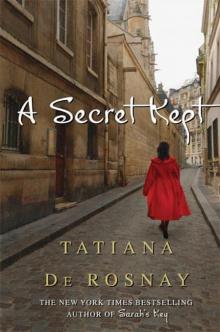 A Secret Kept
A Secret Kept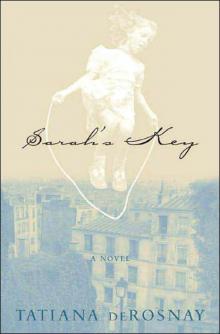 Sarah's Key
Sarah's Key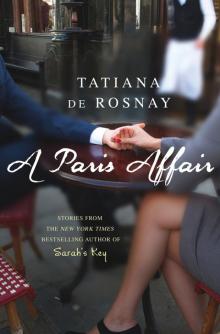 A Paris Affair
A Paris Affair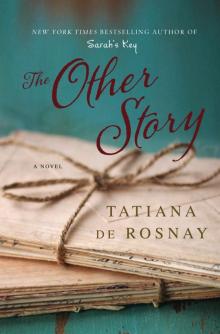 The Other Story
The Other Story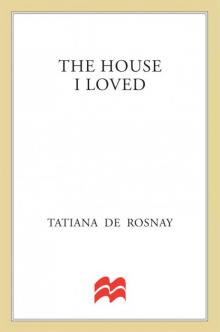 The House I Loved
The House I Loved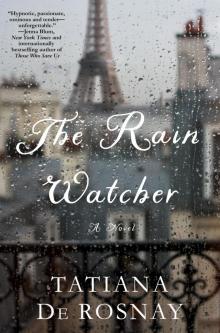 The Rain Watcher
The Rain Watcher